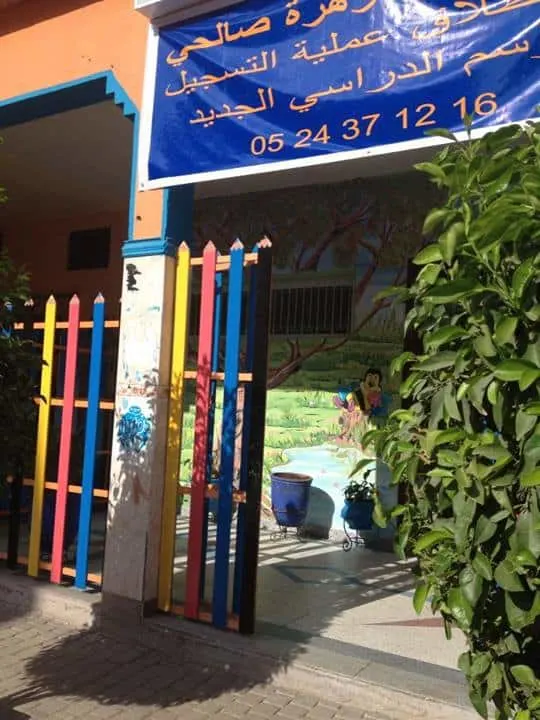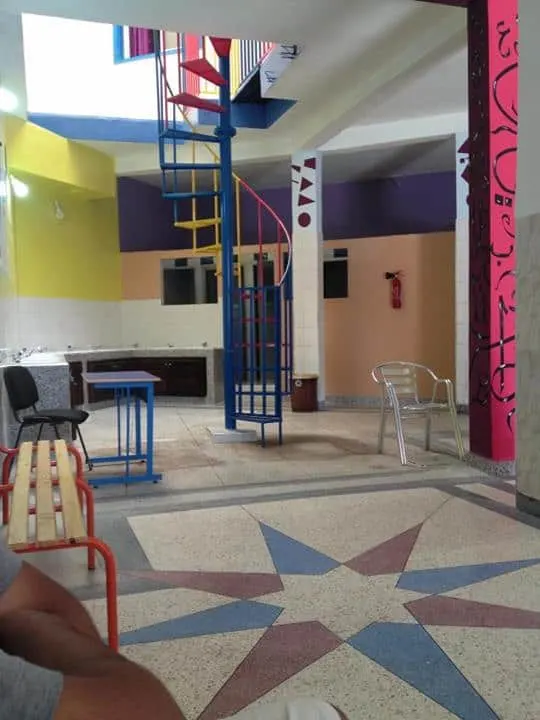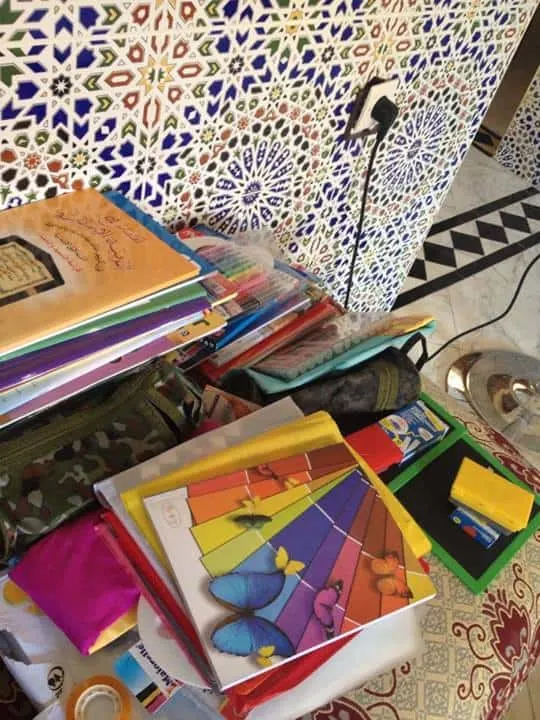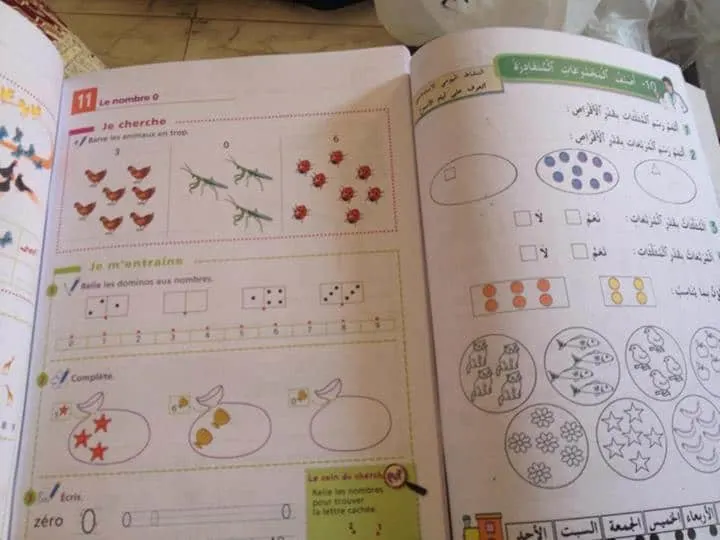(this post was originally written in 2013 and updated in 2015 and 2020 and 2023)
We’ve just begun education our children under this system so while I can’t offer a long-term view, you can get a first hand account of our experience so far.
My kids have been in school in Morocco for two weeks now. A lot of people have asked me what school is like here and it is very different in comparison to the US education system. First, some background. Our children do not speak, read, or write Arabic or French – the primary languages that are taught here.
We decided on a small private school a little way from our house. After talking with the administrators we felt confident that our boys would be taken care of and that they understood the situation. For now both boys are in a 1st grade classroom. While we were worried how this would affect M (who would be entering 4th grade in the US) we see that it is vital he understand the basics before he is put in at his grade level. The school will continually move him up grade levels throughout the year until he is with his peers.
UPDATE: The principal quickly saw that even though M lacked language skills putting him in 1st grade wasn’t going to work. He was moved to 2nd grade rather quickly.
In order to enroll in school families must register with the Education Ministry and provide paperwork that they are Moroccan residents. We are currently working to secure all of of our paperwork so we met with the local representative for the ministry who gave the green light for our kids.
One thing we’ve learned is not all schools are the same.
We visited another, larger, private school and were told the kids would need to sit a placement test with the education ministry and then go to public school until their Arabic and French was “good enough” to attend that school. No thanks.

There are three big differences we’ve noticed about attending school in Morocco.
1) Most people prefer private school to public schools. Under Morocco’s Family Code children are required to attend school until age 16 (though many poor children don’t attend at all). Public schools are available though the general consensus is that they are underfunded and overcrowded. In talking with some people they feel the public schools are improving however, in big cities (like Marrakech) there is still a problem with overcrowding.
Private schools require a registration fee that can range from about $50 upwards of a few thousand dollars. Then there is a monthly fee for attendance. We pay about $70 a month for each of our children to attend school.
2) School Hours. Our kids are still having a hard time with this. School here begins around 8am – 12pm. The kids then go home for lunch, returning to school from 2:30-5:30. It’s a big change for everyone. It’s also meant I have to adjust my schedule and plan a lunch meal for them. It also ends up to be a lot of running around – having to drop off and pick up kids 4x a day. I can’t see a system like this ever working in the US where there are a majority of homes in which both parents work outside the home.
3) School Supplies. In the US schools provide a list of basic supplies children need; backpacks, notebooks, pens/pencils, etc. Here we received a 2 page list of everything our kids would need. Not only do they have to bring supplies all books have to be purchased as well. Because children are educated bilingually there are 2 of every book.
A French and Arabic Math book, French and Arabic science book, etc. We also are asked to bring paper for the printers, notebooks (and colored covers), and a lot of other things. For the first grade materials it cost us $150. In a few months we’ll need to buy all the 2nd grade books/materials for M. $150 is a big expenditure for us, and would be for most American parents – it’s really A LOT of money for many Moroccan families.
Children who attend public school are also required to purchase their text books and supplies though I’m told it’s not quite as expensive. Oh, and one other difference. We provide the list to a “supply store” that carries each school’s books. The shop owner then collects everything and packages them so there’s not nearly the same level of fun selecting materials as there is in the US.
The first day of school here is not a big deal. In fact most kids either show up late or sometimes don’t go the first day at all. I have been trying to understand this but am still drawing a blank. It was really sad for me the first day and it was the first time I’ve ever cried dropping them off to school.
Schools are very recognizable by their bright colors. They are built into neighborhoods, just like a big house. Our boys school sits next to a bakery. There’s no central air conditioning and I’m guessing there’s no central heat in the winter. Children have a “recess” in the mid-morning where they can play in the courtyard area and have a snack that they bring from home.
There aren’t typically music classes or gym classes but I do think there are some art activities (guessing by the supplies we had to buy). Sometimes schools teach a third language (English is most popular, then Spanish). This is taught as a second language as in US schools. Children spend a few hours a week learning the basics. The core studies however are done in tandem between French and Arabic.
While private schools provide transportation most public schools do not. There are a lot of small neighborhood schools here in Marrakech, in fact, there are often several within a very small distance. In rural areas and small cities, there are fewer options. In many desert and mountain communities, children may have to walk several miles to get to schools that are much direr than those in the city.
International Schools in Morocco
Several people have asked me about international schools. I have limited experiences with these kinds of schools. They are clearly an option in Morocco but in most cases are very expensive. Most are attached to foreign missions in some way.
UPDATE July 2015: Our kids have been attending school for two years now. At the beginning of their second year in Moroccan school we moved them to a newly opened school a bit further from our house. The main draw was the principal was trained in the UK and speaks great English. This makes it easy for me to call her and ask about things I don’t understand or have questions about and gave the children a way to get help if they really couldn’t be understood.
At the end of two years I’m happy to report M is doing excellent. He speaks fluent Arabic and understands, reads, and writes in French though is not as verbal. K is struggling a bit more. He is doing well in Arabic but a bit behind in French. We’re not too worried yet but continue to work with him. One thing we’ve learned is this process takes time.
Kids are resilient and DO learn quickly but don’t expect miracles. This is a challenge for them and many times they say they wish they were back in the US where everything was just in English. But, we’re getting there!
UPDATE SEPTEMBER 2020:
This year is undoubtedly not like any other. Our kids are a lot older now (13 and 16) and that means they’re looking at the next stage of life. We made a lot of changes for this school year.
Our oldest son has decided that he will complete his schooling via homeschool in the American system. I wrote a much longer post on how we’re homeschooling high school in Morocco here.
Our middle son (we now also have a 2-year-old) we transferred to a small Waldorf-style school that uses the French homeschool system. We made this move because we felt it was what was best for his personality. As he got older he struggled in Moroccan schools which are really a one-size-fits-all situation. We’ve just begun this journey but so far it seems like the right move.
UPDATE SEPTEMBER 2023:
Our journey has been long and interesting. Our oldest son finished high school and moved to the US in May of 2022. He is living and working in the US while he continues his university education. For the last school year our middle son tried online schooling as well. It did not work as well for him and we ultimately decided it wasn’t the best fit.
However, because he was taken out of the French system (where he had previously been) he could not go back in easily. We ultimately decided that in order for him to finish his education in the best way he needed to be in the US. He is living with his brother while finishing high school in an American public school. Dad and I fly back to the US every month (alternating) to make sure things are on track. Our youngest son remains in his nursery school for one more year and we’ll begin thinking about his primary school education.
We have learned that being flexible and adapting to the needs of each of our children is really crucial. There is no single good answer and any parent with kids in school in Morocco will tell you the same thing. It’s a big decision but being adaptable and flexible is key!



H
Wednesday 27th of August 2025
Thanks for writing this post. Do elementary schools in Morocco teach Darija? I am considering the move to Morocco but I want my kids to learn Modern Standard Arabic (not Darija) as it is more widely used across Arab countries. Any the schools for this?
Amanda Mouttaki
Saturday 6th of September 2025
It depends, Darija is the colloquial language so most teachers speak in Darija. Kids learn MSA but everyone speaks darija.
E
Wednesday 7th of June 2023
Hi, I teach at an international school in Morocco and it is an American curriculum taught in English. The students have electives which include music, fine arts, French, Arabic, and they get gym time and are offered an excellent selection of extra curricular activities all year long. Like in American schools, the students are only asked to provide basic school supplies such as pencils, erasers, coloured pencils, and this kind of thing. It is very much like school in Canada or the USA. I have no idea the tuition costs for a child to attend our school but it really does provide a western style education. Our school hours and holidays also follow an American style so 8:30 to 3:00 with lunch at the school.
Amanda Mouttaki
Sunday 23rd of July 2023
Thanks for your insights. Generally (at least from my research in looking for my own kids) the cost of the books etc is included in the tuition which is extremely high $12,000-$15,000 per year, per child). It's likely that those costs are bundled in.
Heather
Thursday 17th of November 2022
If I plan to continue to homeschool my children when we move to Morocco, will they be able to take the exam to obtain their high school diploma in order to go to university in Morocco?
Amanda Mouttaki
Sunday 20th of November 2022
No they will not.
Khadija
Friday 2nd of October 2020
Hi, I live in us and I am moroccan and me and my kids are planning on move back to Moroccan but I want my kids to Continue to learn in English and learn how read and write in Arabic and French. I have 3 kids they speech fluent English and Arabic. I am planning to move Morocco and I want them to go a private school and keep learning in English but I want them to learn Arabic and French. Do you have program that you used for my kids. Pls and thank you
Amanda Mouttaki
Saturday 3rd of October 2020
I think your first challenge will be how old your kids are and what Moroccan schools will accept them. You might look into a British, Canadian or American private school and then do supplemental French and Arabic. Most Moroccan private schools won't accept kid who don't have French and Arabic after they are a certain age.
Meng
Monday 23rd of September 2019
We’re planning on going to Morocco next year for 2 weeks. We’re saving enough money to sponsor a 1st grade public school with 30 students. Can you give me the list of supplies they need? Can you also recommend a store in Marrakech to buy it? Thank you.
Amanda Mouttaki
Tuesday 24th of September 2019
Hello - each school here has a list of supplies each student needs to have at the beginning of the year. I'm not sure how the most practical way would be to get the items as each school has a different set of requirements. I'll have to think a little on how to do this.